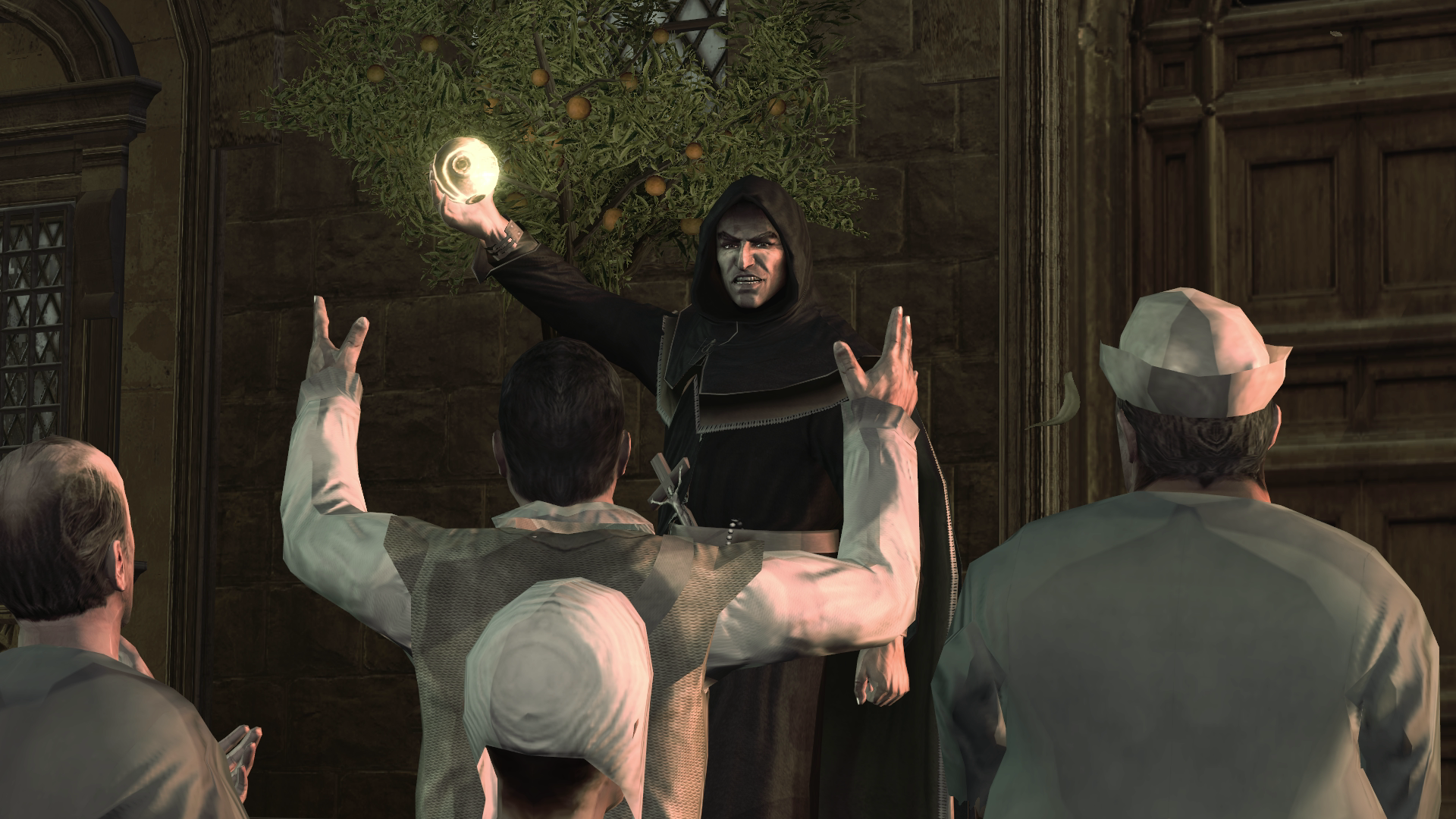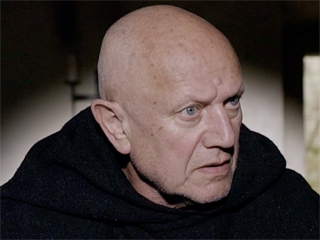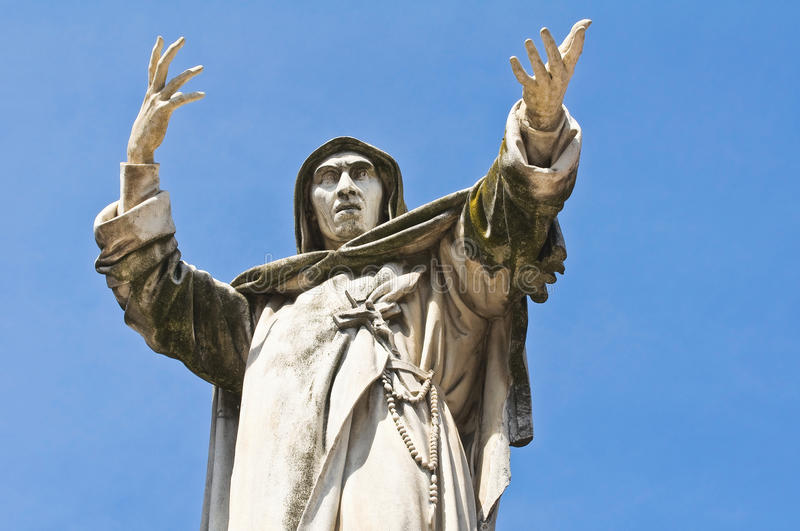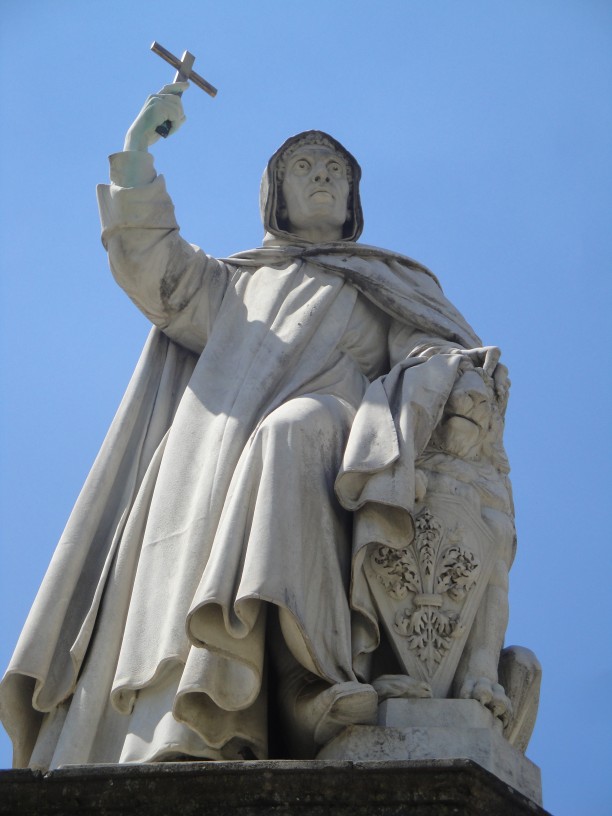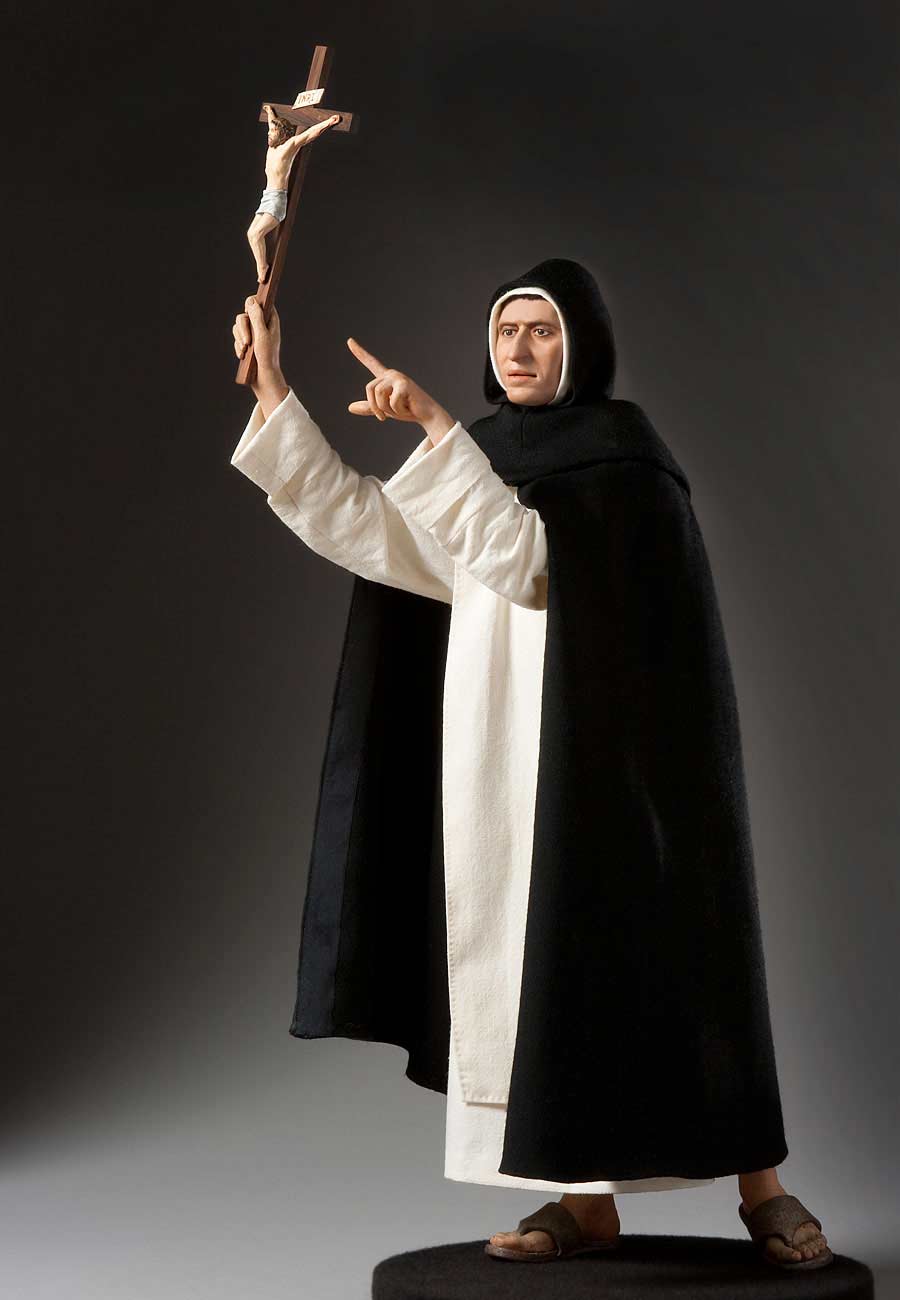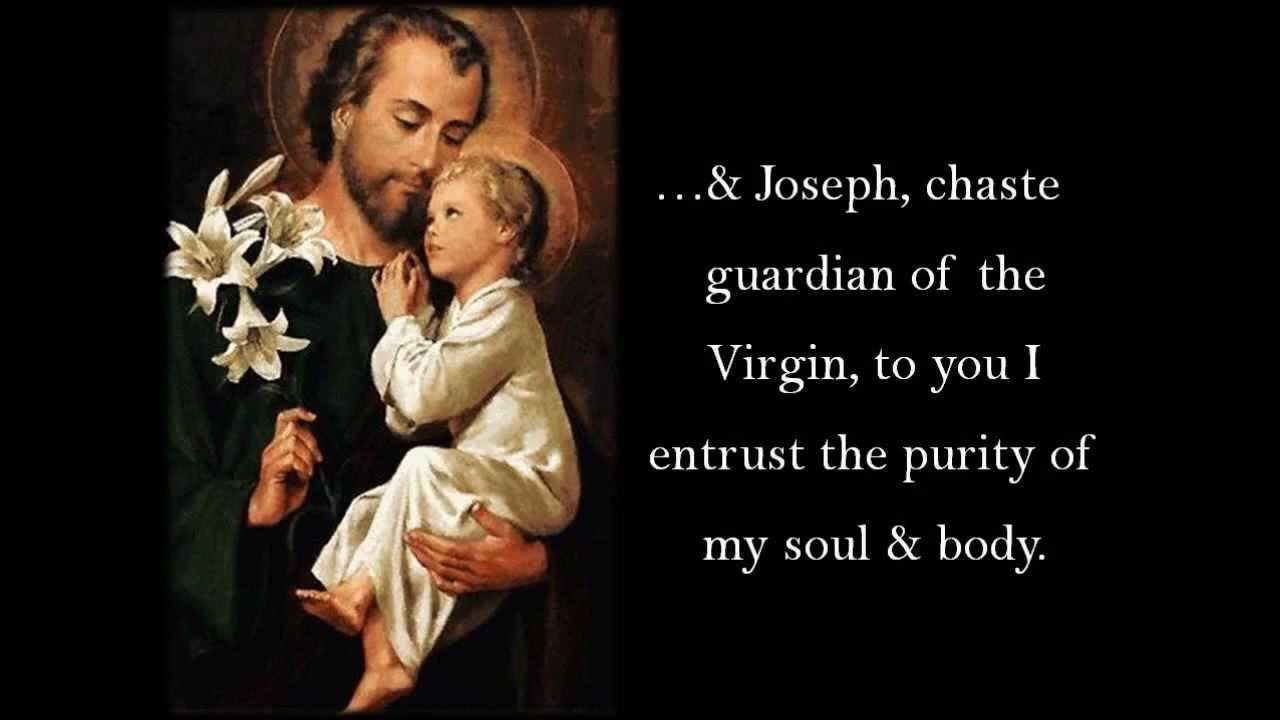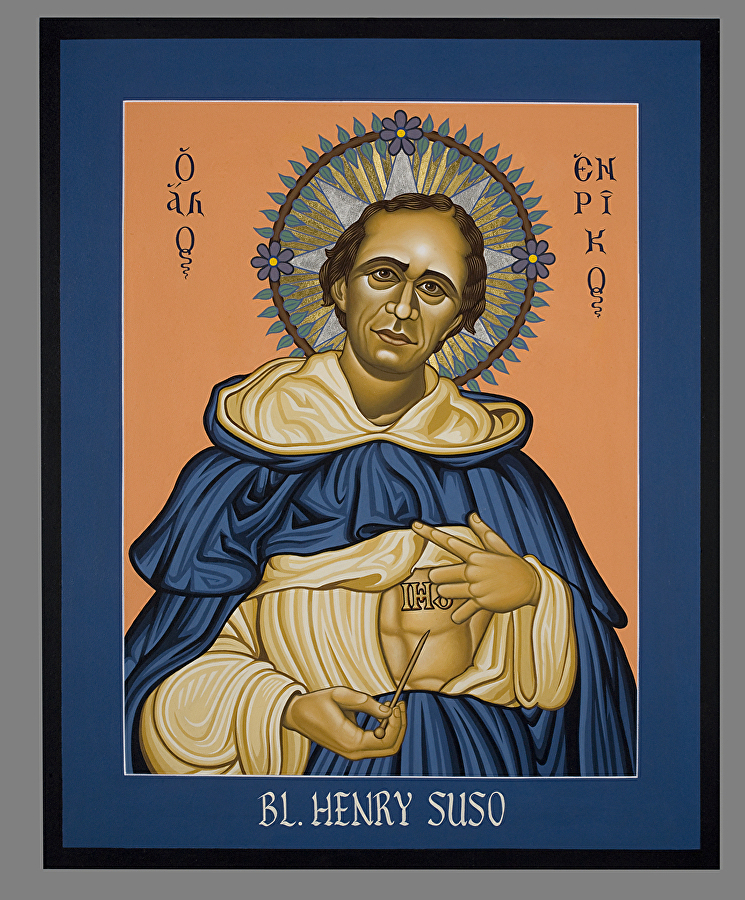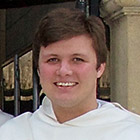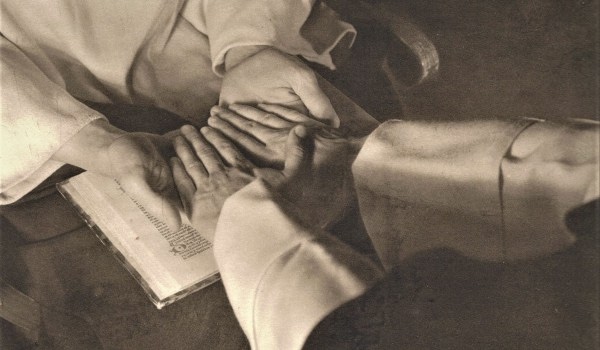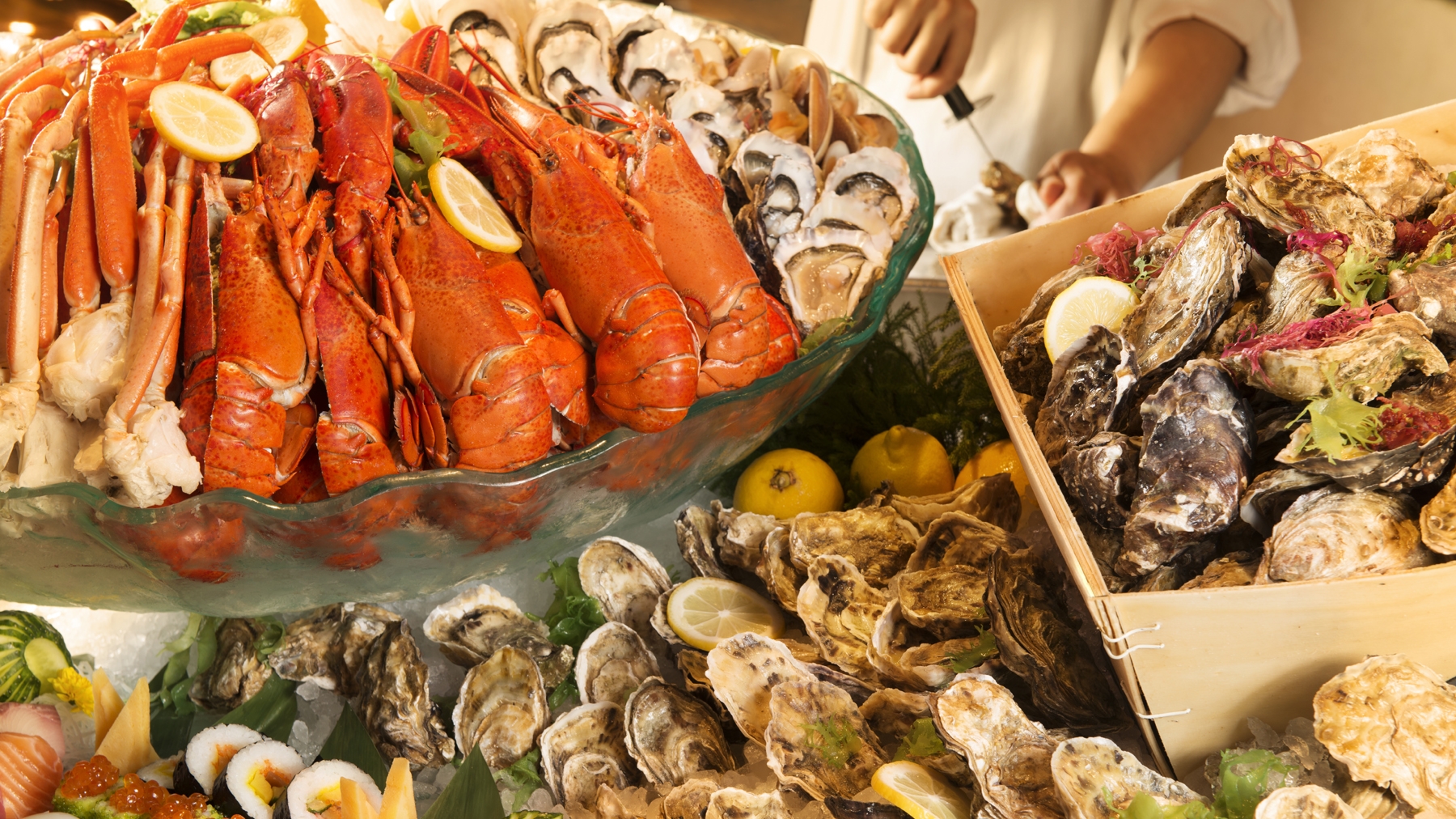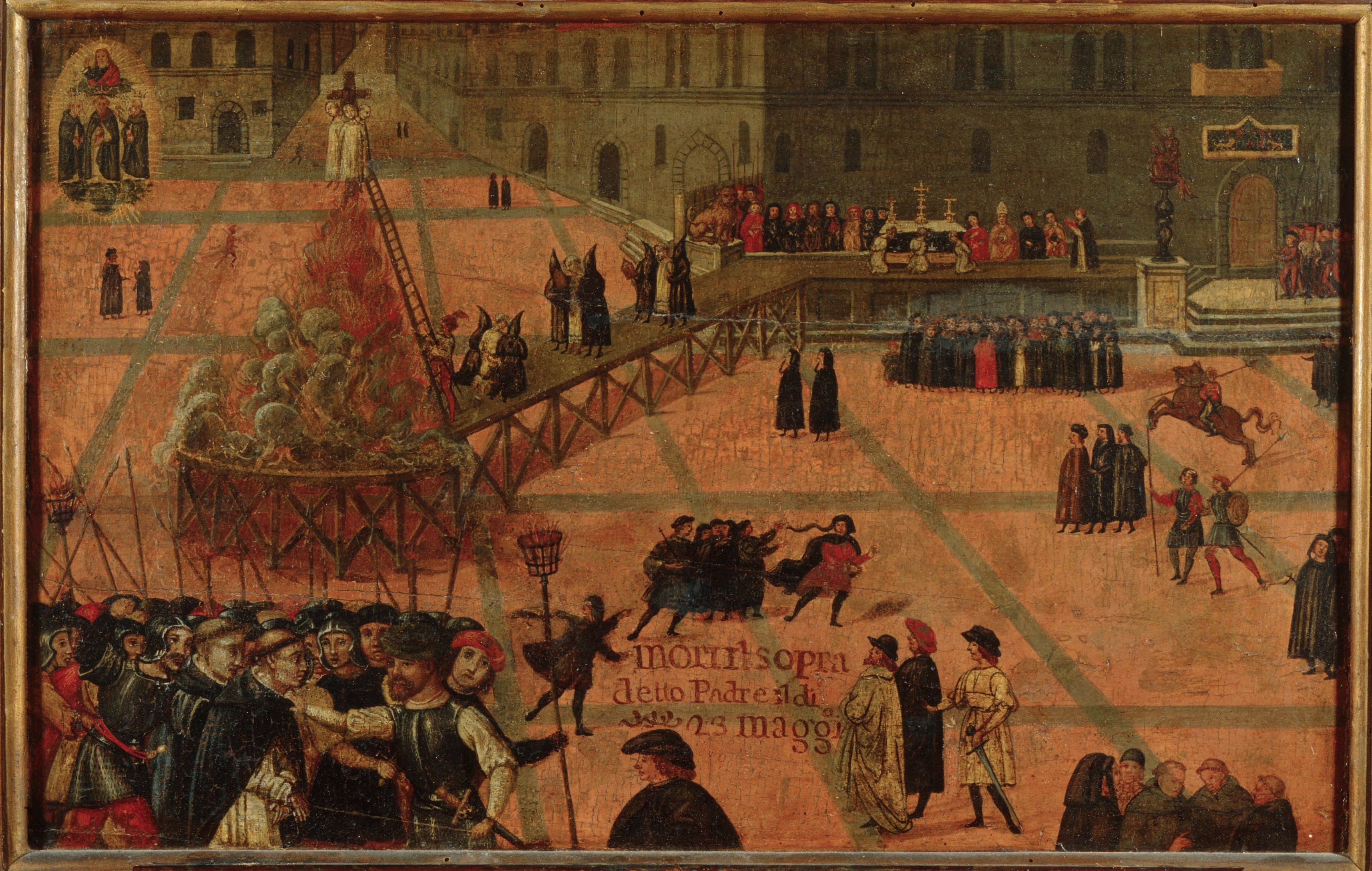
-Filippo Dolciati (1443 – 1519), “Execution of Girolamo Savonarola”. 1498, Florence, Museo di San Marco, please click on the image for greater detail.
He called the Church of his day a “harlot” and a “monster of abomination”. Protestants see him as a forerunner of the Reformation. St Ignatius of Loyola had his works burned and called him an enemy of the papacy. He is mentioned in Chapter 6 of Machiavelli’s The Prince. He is immortalized in the computer game “Assasin’s Creed II” (2009).

-Savonarola character in “Assassin’s Creed 2”.
His execution is memorialized in the Showtime TV series “The Borgias” (2011-2013). Caution: The show took some HUGE dramatic liberties particularly in regards to the Bonfire of the Vanities, the trial by fire and Savonarola’s execution. You can see in the below photo Savonarola’s character has not been hanged, is still alive, and Pope Alexander VI was in Rome at the time of the execution.
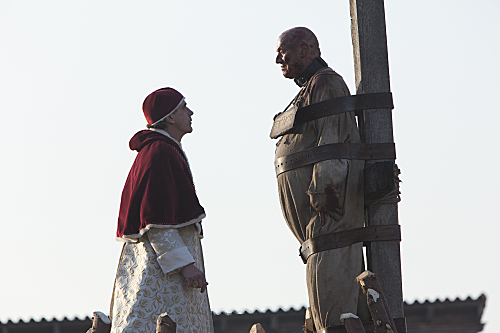
Savonarola captured hearts as a preacher. His powerful apocalyptic visions warned that God would soon scour the world and that Florence, God’s chosen city, had better be ready. Contemporaries speak of the spellbinding power of these sermons; Savonarola’s followers were called piagnoni, or weepers, because he so often moved them to tears. As evidence of his powerful charisma, Savonarola managed to convince the highly humanistic Florentines to surrender their mirrors, dice, cards, cosmetics and nude paintings and burn them all in the Piazza di Signoria in a towering bonfire of the vanities. He also demanded repression of homosexuals. He created a temporary republic in Florence.
He was also a friend to the poor. Under Savonarola, the city created a building society that offered loans at rates well below what was demanded by Florence’s private bankers — 5 to 7 percent, as opposed to the 32.5 percent that had been standard practice under the de Medicis. One of the charges that led to Savonarola’s downfall was that he impoverished the city by refusing to ever turn away a beggar.
He also patronized the famous painters of his day. Michelangelo would later say that when he painted the ceiling of the Sistine Chapel, it was the sermons of Savonarola he heard in his mind.
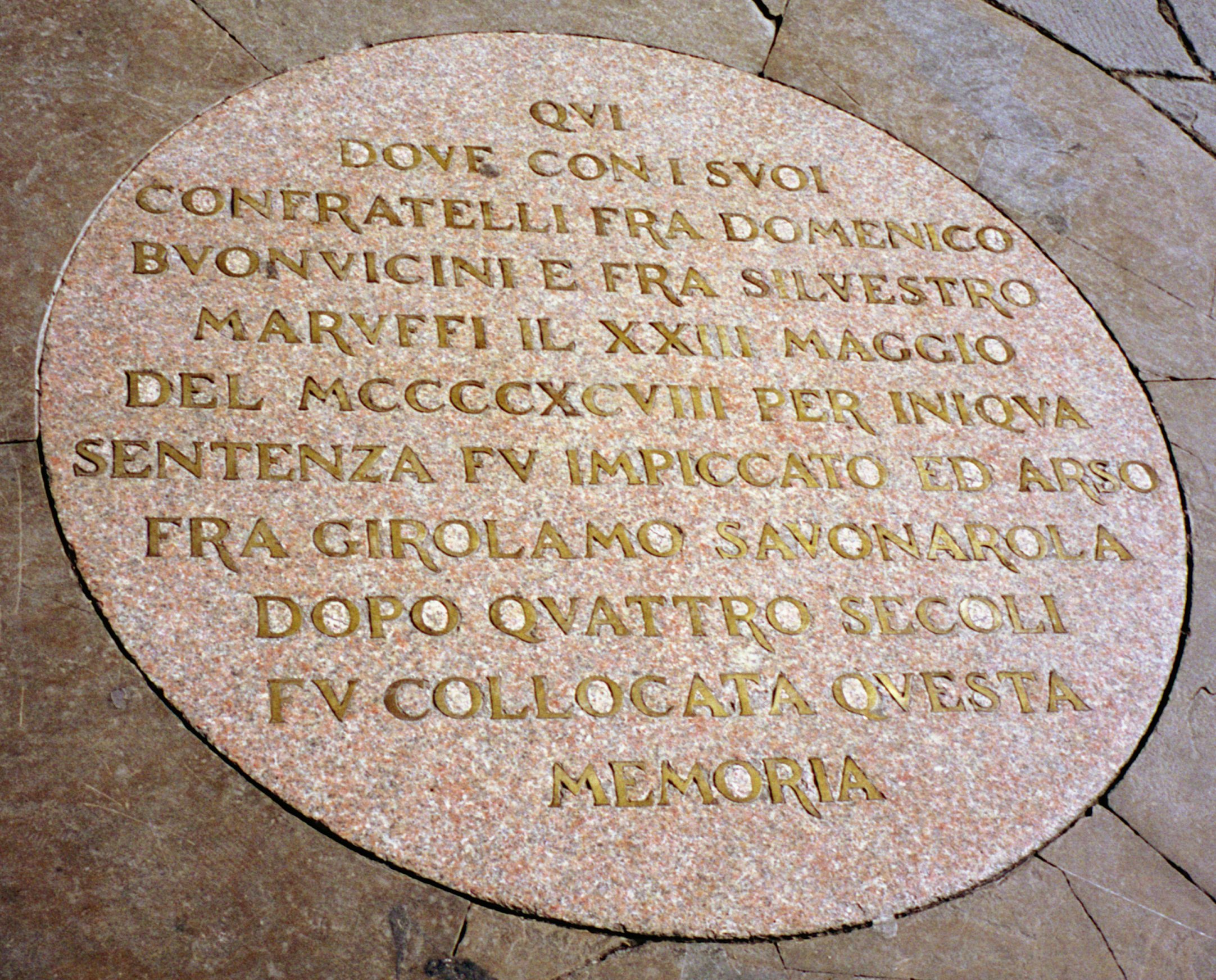
-a plaque commemorates the site of Savonarola’s execution in the Piazza della Signoria, Florence. Please click on the image for greater detail.
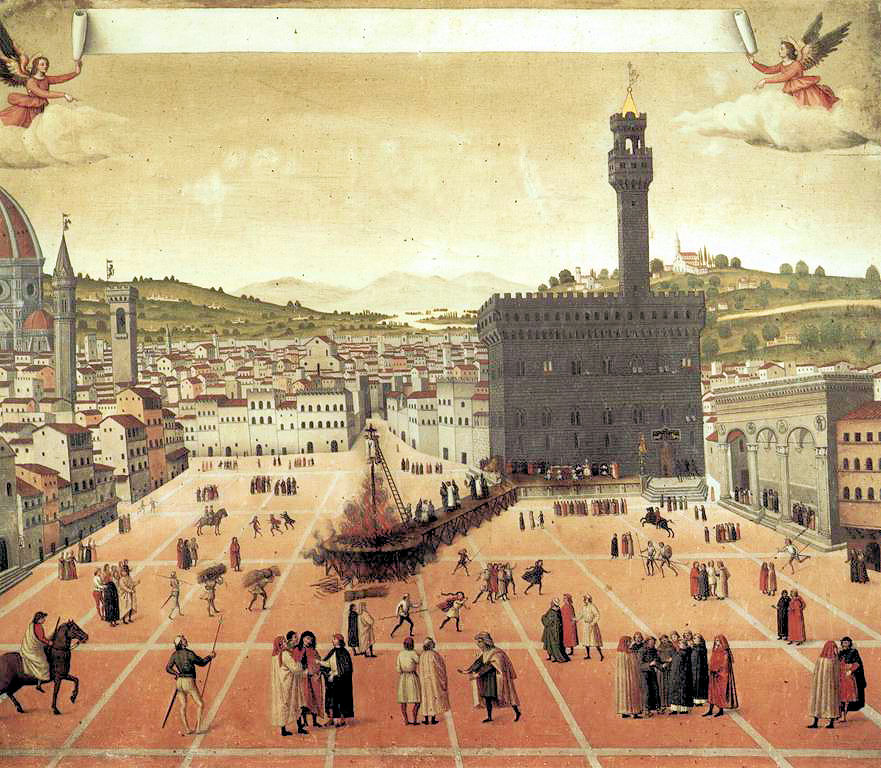
-painting (1650) of Savonarola’s execution in the Piazza della Signoria, please click on the image for greater detail.
Savonarola was hanged and burned in Florence on 23 May 1498 for heresy and schism. Simone Filipepi, the brother of Botticelli, has left a detailed description of the execution of Savonarola. On 12 May 1497, Pope Alexander VI excommunicated Savonarola and threatened the Florentines with an interdict if they persisted in harboring him.
Interdict is still an existing censure under Canon, or Church, law, and a most serious one in the Catholic Church. It means the prohibition of all sacraments and the invalidity of any attempted to be performed by the persons so placed under ecclesiastical interdict. Sacraments to the Catholic are the primary channels of grace. No grace, no heaven. Children cannot be baptized, and are therefore excluded from the Church, and hope of salvation. Mass cannot be celebrated validly and so no real center of communal liturgical life. No Mass, no point to being Catholic; the loss thereof, bringing one so condemned a step closer to Hell. No marriage, only fornication, and bastard/illegitimate children. No holy orders, no priesthood, another defining/central aspect of Catholic life. No last rites, no viaticum, or last Eucharist, before death. You can see, to a Catholic community, even in early 21st century America, this is most serious. It literally dissolves the fabric of the community. It is meant to be corrective. Even today, in Church disputes with hierarchs, interdict is frequently threatened.
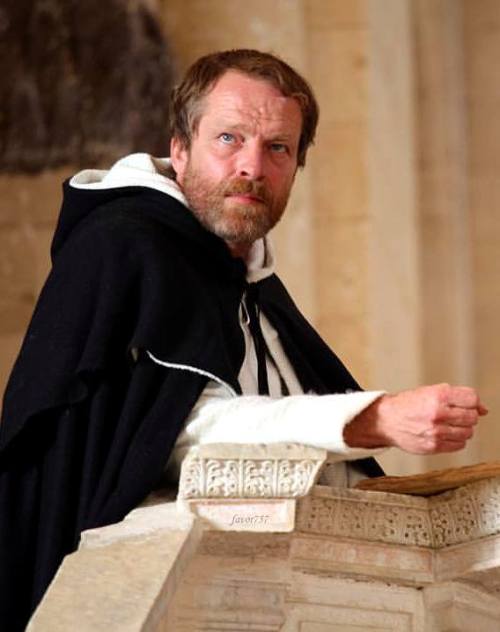
-Iain Glenn, of Game of Thrones, Resident Evil, & Downton Abbey fame, as Savonarola, in “Borgia: Faith & Fear”
On 18 March 1498, after much debate and steady pressure from a worried government, he withdrew from public preaching. Under the stress of excommunication, Savonarola composed his spiritual masterpiece, the Triumph of the Cross, a celebration of the victory of the Cross over sin and death and an exploration of what it means to be a Christian. This he summed up in the theological virtue of caritas, or love. In loving their neighbour, Christians return the love which they have received from their Creator and Savior.
Savonarola hinted at performing miracles to prove his divine mission, but when a rival Franciscan preacher proposed to test that mission by walking through fire, he lost control of the public discourse. Without consulting him, his confidant Fra Domenico da Pescia offered himself as his surrogate and Savonarola felt he could not afford to refuse. The first trial by fire in Florence for over four hundred years was set for April 7. A crowd filled the central square, eager to see if God would intervene and if so, on which side. The nervous contestants and their delegations delayed the start of the contest for hours. A sudden rain drenched the spectators and government officials cancelled the proceedings. The crowd disbanded angrily; the burden of proof had been on Savonarola and he was blamed for the fiasco. A mob assaulted the convent of San Marco.
Fra Girolamo, Fra Domenico, and Fra Silvestro Maruffi were arrested and imprisoned. Under torture Savonarola confessed to having invented his prophecies and visions, then recanted, then confessed again. In his prison cell in the tower of the government palace he composed meditations on Psalms 51 and 31. On the morning of 23 May 1498, the three friars were led out into the main square where, before a tribunal of high clerics and government officials, they were condemned as heretics and schismatics, and sentenced to die forthwith. Stripped of their Dominican garments in ritual degradation, they mounted the scaffold in their thin white shirts. Each on a separate gallows, they were hanged, while fires were ignited below them to consume their bodies. To prevent devotees from searching for relics, their ashes were carted away and scattered in the Arno
Savanarola was a fierce critic of ecclesiastical corruption, and this is perhaps the most contested aspect of his legacy for those proposing to canonize him. He referred to Pope Alexander VI as a “broken tool,” accusing the pope of practicing simony and of dubious personal morality. He defied the pope by aligning Florence with the French king, Charles, rather than the “Holy Alliance” of Italian city-states championed by Alexander. Toward the end, Savonarola called for a church council that would depose Alexander.
There was never serious question about Savonarola’s doctrine — his chief theological work, The Triumph of the Cross, is widely viewed as orthodox. In 1558, Pope Paul IV — who had served in the court of Alexander VI — said that Savonarola was not a heretic. The question for examiners today is not doctrinal but disciplinary: whether Savonarola defied the authority of the pope in impermissible fashion. Dominicans and Jesuits still feud within the last twenty years as to the sanctity of the man. Although, the Jesuit view has largely been attributed to contemporary hearsay, and not a critical study of his works.
In English the name of Savonarola may be synonymous with religious fanaticism, but many Italians, and Florentines in particular, have a different image. In an age of corruption, Savonarola represented honest government, making him something of a patron for the current Italian drive to break the grip of cronyism and political patronage that has long dominated their politics.
As an ecclesial dissenter, Savonarola is popular among today’s Catholics who believe the church could stand some reform.
There are even those who argue that had the Renaissance papacy been a bit more open to Savonarola’s critique, the church might have been spared the agony of the Protestant Reformation.
Whatever the case, Savonarola’s most ardent supporters seem unlikely to be discouraged by anything historical research might uncover. He was a “man of faith who loved Jesus Christ,” according to Dominican Fr. Armando Verde in the International Herald Tribune. Savonarola may have made compromises in the rough-and-tumble of Florentine politics, Verde said, “but on the ethical and spiritual level, absolutely never.”
The Piagnoni kept his cause of republican freedom and religious reform alive well into the following century, although the Medici—restored to power in 1512 with the help of the papacy—eventually broke the movement.
“Girolamo Savonarola was born in Northern Italy in 1452 to a well-to-do merchant family. Growing up, he was taught a love for the moral life and a hatred for decadence by his fervently religious grandfather. At the age of twenty-three, he abandoned all the vanities of the world to give himself to God alone, leaving home to become a Dominican friar. He was known to be fervently observant in his religious life, and from this personal holiness flowed a preaching that captivated all hearers.
He was soon brought to the great city of Florence at the request of the ruling Medicis. All were amazed by his gift of prophecy. In particular, he prophesied disaster in the republic of Florence. Though Florence was one of the more prominent cities of Europe at the time, when Charles VIII of France was making his way toward the republic, the citizens began to take Savonarola’s prophecy seriously. One might attempt to credit his prophecies (and there were many) to political savvy, but there was always something too vivid and concrete about them; at the very least, his contemporaries learned to trust him.
Savonarola was sent as an ambassador to make an agreement with Charles VIII to prevent the otherwise almost certain sack of Florence. After this success, trust in Savonarola was so great that he was able more or less at his will to write up the new constitution for a democratic republic. He even was able to go so far as to plea, successfully, for peace toward the friends of the old Medici government. The few years of his influence are something of an eloquent testimony to the power of the word of God to create and sustain peace in a troubled world.
Unfortunately, he had powerful enemies. The allegiance of Florence with Charles VIII was disadvantageous for much of Italy, but this was not Savonarola’s greatest obstacle. He preached against moral depravity in an emerging decadent renaissance society. He feared no man in his call for the pursuit of the Christian ideal. This made him enemies, both at home and abroad. Because of his popular appeal, it was difficult to have him removed. At the same time, for every moral reform he successfully enacted in society, his enemies became increasingly infuriated. But the friar feared no man, giving himself entirely to preaching the Truth.
As the threat of invasion subsided, Savonarola’s influence waned and politics became increasingly turbulent. Elections occurred every few months, and power passed rapidly between his friends and enemies. All the while, his Florentine enemies plotted against him in secret, detesting his moral reforms, which made difficult the life to which they once were accustomed. When his authority to preach publicly was finally revoked and he was unable to defend himself, it was only a matter of time.
On Palm Sunday in 1498, Savonarola’s enemies went to work. They stirred up the mob and readied to besiege the convent of San Marco. In his last homily, he proclaimed, “Lord, I thank thee for desiring now to make me in Thy own image.” The convent was attacked and he was captured. There followed weeks of imprisonment, torture, and forged confessions. He was condemned to die on May 23, 1498.
Savonarola’s last act before his death was to bow his head in acceptance of the plenary indulgence granted to him by the pope. His last words were those of the creed. After he and his two closest companions were hanged and burned, his ashes were thrown in the river to prevent anyone from collecting his relics. Since then, history has long attempted to bury his legacy, just as his executioners did; he was long regarded as a backwards hack who scared Florence away from renaissance progress. But recent scholarship has brought him into the light. Two of his foremost biographers, Josef Schnitzer (Savonarola) and Roberto Ridolfi (The Life of Girolamo Savonarola), have even predicted his eventual canonization as a saint, although this has not yet come to be. He died a faithful son of the Church, giving his life for the Bride of Christ, and never giving up on the word of God, even when it cost him his life. Though his ashes were scattered, his legacy lived on.”
“Self-Pity is a wonderful companion. She understands you. She comforts you. She fixes you a stiff drink and reassures you that you’ve been wronged. After all, you have been wronged, haven’t you? She knows the real story. To her, you are perfect.
When we pity ourselves, we think we are responding rightly to an injustice. We become sad and dwell on that sadness, a kind of emotional signal that matches our judgment that we’ve been “dealt a bad hand.” But, if it is so noble that we feel the correct response to injustice, then why does self-pity leave us unsatisfied? That lady, Self-Pity, isn’t there to give you an aspirin when the drink leaves you sick.
St. Thomas reminds us that that “self” we append to our term is our first mistake, distorting the whole line of reasoning: “Since pity is sympathy for another’s distress, it is directed, properly speaking, towards another, and not to oneself” (ST II-II q. 30, a. 1, ad 2). We envy when we feel sorrow at the good we see in another. This is a vice. On the flipside, we pity when we feel sorrow for the evil (or lack of good) we see in our neighbor. This is a virtue.
And yet, is it so wrong to pity ourselves for the absence of good we observe in our own lives, whether it’s being fired from a job, facing the derision of a close friend, or other painful experiences? These are all legitimate things to lament. In reality, however, how often do we stop at this? We cast off Lady Lament, pious and prudent as she is, and seek out Self-Pity. She echoes back to us our estimation—usually our overestimation—of what we deserve from bosses, from friends, from God. And she is not without her brood of stepchildren: Hatred, Resentment, Indignation. Before we know it, we have taken into the home of our hearts a whole family of vices that pull us down into a spiral of cold, violent bitterness.
Instead of self-pitying, let us be sorrowful and contrite. In sorrowful contrition—wherein we may still lament to our heart’s content—we express our sadness for the evil in the world, both done to us and done by us, without losing sight of our fallenness. Christ came to redeem us, sorrowful and fallen, and, like us, he felt immense sorrow; the Gospel’s shortest verse recounts the Lord’s response to the sad news of Lazarus’ death: “And Jesus wept” (John 11:35). When his own hour came, the Son of God did not lay the blame on us or pity his own Passion. He did not wallow in self-absorbed gloom. He instead removed our guilt and gave himself up to death freely. He was sorrowful, even despite his innocence.
Girolamo Savonarola, whose memory is holy to the brothers and sisters of the Dominican Order, was burned at the stake on this day in 1498. In imitation of the Master, this holy Dominican wept, too. Near his death, he penned a sorrowful meditation on Psalm 51. Perhaps this excerpt from it can be a model for our prayer, teaching us not to turn in on ourselves in self-pity, but to rely on the Lord in a spirit of contrition and hope:
An unhappy man am I, bereft of all help, for I have sinned against heaven and earth. Whither to go I know not, nor which way to turn. To whom shall I fly? Who will take pity upon me? I dare not lift up my eyes to heaven, for I have sinned grievously in the sight of God; I find no refuge on earth, because I have given scandal to men. What then shall I do? Shall I despair? Far be it from me! God is merciful; my Savior is gracious. God alone, therefore, is my refuge, He will not despise His own handiwork, nor cast away what is made in His own image. To Thee, then, most gracious God, do I turn in my grief and sorrow; for Thou alone art my hope, Thou alone art my refuge. (Savonarola, Infelix Ego trans. Wilberforce)”
Love,
Matthew


